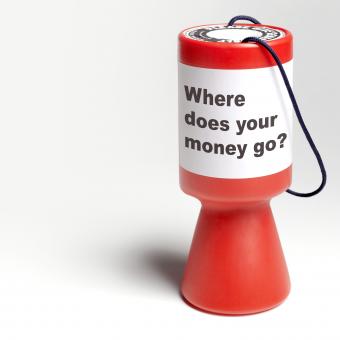
In today's world, you want to check out any charity you're thinking of giving a donation. Even if you believe you feel the organization is everything you've heard in their media hype, there are a few ways you can conduct your due diligence before giving your money.
1. Check IRS Tax-Exempt Non-Profit Status
It may be obvious, but many people neglect to check with the IRS (Internal Revenue Service) to verify that the charity they wish to donate is actually listed as a 501(c) (3). This is the correct tax-exempt status for a non-profit charity and means you can deduct your donation from your taxes. This status means the organization, according to the IRS, "… may not be an action organization, i.e., it may not attempt to influence legislation as a substantial part of its activities and it may not participate in any campaign activity for or against political candidates." If the charity you are considering is involved in any of these activities, they are operating as a legit 501 (c) (3) charity organization.

2. Review IRS 990 Forms
You can review tax-exempt organizations forms free on the IRS website for the years 2018 through 2021. This includes tax-deductible charitable contributions (Pub 78 data). You can download the organizations' forms 990, 990-EZ, 990-PF, 990-N (e-Postcard), and 990-T filed by 501(c)(3) organizations are also available. The IRS 990 forms are meant to provide the public with specific financial information about any nonprofit organization. The IRS and other agencies utilize this information to prevent an organization from taking advantage or abusing their tax-exempt status.
3. Check BBB Wise Giving Alliance
The Better Business Bureau (BBB) has a separate website and entity to review complaints filed against charities. The BBB Wise Giving Alliance, also known by its domain name Give.org, provides consumers with ratings for national charities the same way the BBB main website does for businesses. You can find a listing of the charities the BBB has vetted using their 20 BBB Standards for Charity Accountability. This evaluation looks at the charity's finances, governance, results reporting, and truthful/transparent communications.
4. Visit Charity Watch
Charity Watch provides ratings for various charities. CharityWatch is the former American Institute of Philanthropy (AIP) that was founded 25 years ago. The watchdog group claims to be, "America's most independent, assertive charity watchdog." The group states that its reports are a deep dive that other watch dogs don't take when evaluating a charity. The group has exposed abusive practices of nonprofits as well as those that follow through on their advocacies.
CharityWatch examines the investigated charity's reported financials. The group then audits the annual reports, tax form, state filing, financial statements, and more. The final analysis results in CharityWatch assigning the investigated charity a letter grade between A+ and F. This grading system is based largely on the percentage that the charity provides to the program it supports.
5. Look on Charity Navigator
Charity Navigator makes an assessment of charities that are rated according to Charity Navigator's evaluation of the organization's financial health, accountability, and transparency. The organization is given a numeric score that equates to 1-4 stars, a 0 score, or a CN Advisory that means Charity Navigator encountered things that caused serious concerns about the organization.

6. Search Google for Complaints
A very obvious way to conduct due diligence is to open a Google search browser and enter the type of charity you wish to donate. This could be something like food banks, homeless shelters, or disaster relief. Another search can include addition search criteria, such as in my local area, best rated, highly recommended, and top-rated.
Once you've found a charity, you're interested in vetting, type in the name of the organization along with other search criteria for separate searches for each additional word you add to the organizations' name, such as reviews, rating, complaints, lawsuits, investigations, scandal, scams, and arrest or arrested.
These one word additions tacked on to your search will quickly reveal anything you should know about the organization you wish to donate to. You may find nothing negative and can move on to any other vetting you wish to conduct before giving the charity your money.
7. Check With Federal and State Departments of Justice
There are two additional searches you'll want to conduct before you can be confident in the organization you wish to donate money. You need to check the current legal actions and the archives of the Federal Department of Justice (DOJ). In addition to the federal level, you should also check with your State DOJ for any possible legal action taken against the charity.
Why You Want to Check Out Charities Before Donating
There are many ways an organization can hide behind its status as a non-profit charity. You want to be sure you know who you are giving your money to and what exactly you are supporting when you do.
Some groups call themselves a non-profit charity while misappropriating the donations they receive. There are some charities that use as much as 90% of their donations for "operating costs," which may include exorbitant salaries and perks for those in charge, leaving a meager 10% going to the cause you believed you were supporting with your donation. Checking out charities ensures they are legitimate and allows you to learn what type of transparency they practice for accountability of how the monies they receive are being spent.
Checking out a charity also helps you understand if there are any rules or procedures that must be followed when making a donation. For example, there are definitely procedures to follow when making a hair donation to make wigs for cancer patients. You wouldn't want to spend all that time growing out your hair only to wind up donating it loose in a bag instead of in a neat ponytail as required. Such a donation would be deemed useless and thrown away.
Donating to a Charity With Confidence
Before donating to a charity, you need to do your own due diligence. If you follow these 7 easy ways to check out charities before donating, you'll be confident that your money is going to help those you intended.







